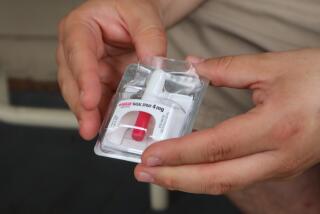Senate Panel OKs Bill on Vaccine
SACRAMENTO — A bill to ban mercury from early childhood vaccines by 2006 moved a step closer to becoming law Wednesday, when it was endorsed on a 10-2 vote by the state Senate Committee on Health and Human Services.
The bill by Assemblywoman Fran Pavley (D-Agoura Hills), which the Assembly approved last month, would eliminate thimerosal beyond trace levels from vaccines administered to expectant mothers and children younger than 3 years old. The compound, which is about half ethyl mercury, is used to prevent the growth of bacteria in certain vaccines.
The bill had been endorsed by the Sierra Club and California Nurses Assn. Two doctors groups -- the California chapters of the American Academy of Pediatrics and the American Academy of Family Physicians -- had previously withdrawn their opposition after Pavley agreed to an amendment that would allow a temporary waiver of the ban in case of a public health emergency.
The bill and similar measures pending in several other states and Congress were inspired by a change in a policy of eliminating the mercury preservative from all routine childhood immunizations.
In 1999, vaccine makers began removing thimerosal from children’s shots as a health precaution after being asked to do so by the U.S. Public Health Service and the Academy of Pediatrics.
But now thimerosal is being reintroduced as part of a decision by the national Centers for Disease Control and Prevention to recommend universal administration of flu shots for infants. The only producer of flu vaccine for children younger than 2 -- Aventis Pasteur Inc. -- makes versions that are free of thimerosal and that contain it, and this fall hundreds of thousands of children could receive the latter version.
In response, thimerosal bans are being pushed in California and elsewhere.
The CDC and Academy of Pediatrics say the risk of flu outweighs any theoretical risk from thimerosal.
More to Read
Get the L.A. Times Politics newsletter
Deeply reported insights into legislation, politics and policy from Sacramento, Washington and beyond. In your inbox three times per week.
You may occasionally receive promotional content from the Los Angeles Times.









